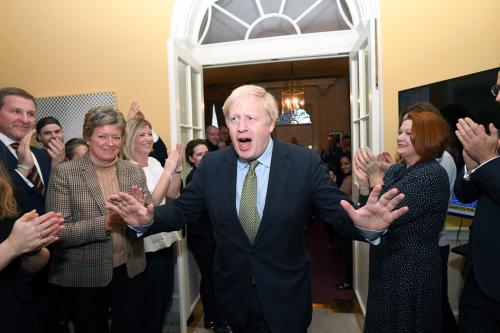In a speech at her Conservative Party’s annual convention, Britain’s Prime Minister Theresa May laid out a bold plan to reform her country—and her party. She may also have provided a template for reform-minded conservatives in the United States who will be challenged to pick up the pieces of the Republican Party after Donald Trump’s increasingly probable defeat.
Prime Minister May framed her party’s task as creating what she calls a “Great Meritocracy”—a country “built on the values of fairness and opportunity, where everyone plays by the same rules and where every single person—regardless of their background, or that of their parents—is given the chance to be all they want to be.” It shouldn’t matter, she said, “where you were born, who your parents are, where you went to school, what your accent sounds like, what god you worship, whether you’re a man or a woman, or black or white.” But if we are honest, she concluded, we will admit that this is not the case today.
The question is what to do about it. The Prime Minister’s answer is to make the Conservatives the party of “ordinary working people.” This means, to begin, acknowledging the legitimacy of the discontent that fueled the pro-Brexit majority in the June referendum. “Just listen to the way a lot of politicians and commentators talk about the public,” she declared. “They find your patriotism distasteful, your concerns about immigration parochial, your views about crime illiberal, your attachment to your job security inconvenient. They find the fact the more than seventeen million voters decided to leave the European Union simply bewildering.”
The explanation, Mrs. May asserted, is class: “If you’re well off and comfortable, Britain is a different country and these concerns are not your concerns. It’s easy to dismiss them—easy to say that all you want from government is for it to get out of the way.” If the Conservatives are to be the party of ordinary working people, they must take populist concerns onboard without surrendering to the populist agenda—or to its least defensible sentiments.
Working-class conservatism can be nationalist without being nativist or isolationist, Mrs. May insisted. It can reassert Britain’s control over immigration without endorsing prejudice against immigrations. It can reassert sovereignty over Britain’s laws and regulations without withdrawing from Europe or the world. And it can respect success in the market while insisting that the successful members of society have commensurate responsibilities to their fellow citizens.
PM May’s exposition of this theme warrants extended quotation. For the successful, what she calls the “spirit of citizenship” means that
You respect the bonds and obligations that make our society work. That means a commitment to the men and women who live around you, who work for you, who buy the goods and services you sell. That . . . means recognizing the social contract that says you train up local young people before you take on cheap labor from overseas. That . . . means you do as others do and pay your fair share of tax.
In Mrs. May’s view, this spirit of mutual obligation among citizens is the core of an honorable nationalism. The problem, she asserts is that Britain’s elite rejects even honorable nationalism outright:
Too many people in positions of power behave as though they have more in common with international elites than with the people down the road, the people they employ, the people they pass in the street. But if you believe you’re a citizen of the world, you’re a citizen of nowhere. You don’t understand what the very word ‘citizenship’ means. So if you’re a boss who earns a fortune but doesn’t look after your staff, an international company that treats tax laws as an optional extra . . . a director who takes out massive dividends while knowing the company pension is about to go bust, I’m putting you on notice: This can’t go on anymore. A change has got to come. And . . . the Conservative Party is going to make that change.
A working class conservatism also means rejecting the libertarian temptation and acknowledging “the good that government can do.” Here again, I quote PM May’s vision of an activist conservatism at some length:
[It’s] time for a new approach that says while government does not have all the answers, government can and should be a force for good; that the state exists to provide what individual people, communities and markets cannot; and that we should employ the power of government for the good of the people. Time to . . . embrace a new centre ground in which government steps up—and not back—to act on behalf of us all. Providing security from crime, but from ill health and unemployment too. Supporting free markets, but stepping in to repair them when they aren’t working as they should. Encouraging business and supporting free trade, but not accepting one set of rules for some and another for everyone else.
In the body of her speech, PM May sketches the public policies that flow from her vision of working-class conservatism: increased investment in affordable housing and infrastructure; a “new industrial strategy” that invests in industries of “strategic value to our economy”; good public schools for everyone; and social reform to reduce poverty among ethnic minorities and increase opportunities for everyone to attend college—including “white working class boys [who] are less likely to go to university than any other group in society.”
It also means making markets work for working people. Citing Edmund Burke, the Prime Minister reminded her fellow Conservatives that preserving something important means being prepared to reform it. That is why “where markets are dysfunctional, we must be prepared to intervene”—for example, where companies use opaque pricing structures to confuse consumers, where rural areas don’t have access to broadband, or where private capital does not give ordinary people a fair chance to buy homes.
And it means, finally, that the goal of achieving a balanced budget must itself be balanced against the imperative of “invest[ing] in the things that matter, the things with a long-term return.” Monetary policy has run its course, the Prime Minister said; it’s time to put fiscal policy to work to build an economy that works for everyone.
Prime Minister May ended her speech with a pointed homily based on the British Olympic triathlete who stopped to carry his exhausted brother, a fellow competitor, across the finish line. “There in that moment,” she said, “we saw revealed an essential truth: That we succeed or fail together. We achieve together or fall short together. And when one among us falters, our most basic human instinct is to put our own self-interest aside, to reach out our hand and help them over the line.”
“The central tenet of my belief,” she concluded, “is that there is more to life than individualism and self-interest. We form families, communities, towns, cities, counties and nations. We have a responsibility to one another. And I firmly believe that government has a responsibility too.”
No doubt the Prime Minister’s speech has the late Margaret Thatcher revolving briskly in her grave. But I doubt that any faction of today’s Republican Party would receive it any more favorably. Led by House Speaker Paul Ryan, small government conservatives work tirelessly to cut government, whatever the consequences for ordinary people. Social conservatives remain obsessed with prosecuting an obsolete culture war. And egged on by Donald Trump, conservative populists are determined to translate their intense passions into self-defeating public policies.
The task of Republican reformers after Trump’s defeat is the same as Theresa May’s after Brexit: to give voice to the legitimate nationalist sentiments of the white working class without succumbing to nativism and isolationism. But to do this, they will have to take the same step that Prime Minister May has—to acknowledge that neither individual effort nor civil society will suffice to build a society in which everyone—including minorities and children of the white working class–has a fair chance to succeed. Without an activist—and in some respects larger—government, conservative reform will remain merely hortatory. To rebuild their party, reform conservatives will have to abandon their timidity, grasp the nettle firmly—and reject the anti-government prejudice that has long defined their party’s creed.









Commentary
What Republicans can learn from PM Theresa May
October 6, 2016